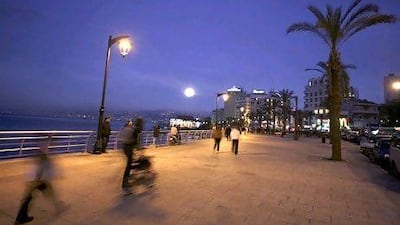It was reported in the Lebanese press last week that the Hilton hotel group had allegedly planned to shut down the Metropolitan Palace, one of two adjacent hotels it runs in the Beirut suburb of Sin El Fil. This, if it was true, was news. It was the biggest nail in Lebanon's tourist coffin to date and further evidence that Lebanon's bling-fuelled renaissance was losing its lustre.
Within days Hilton denied the reports but the rumours were enough to mobilise Lebanon's tourism minister, Fadi Abboud, to show his support for the owner, Khalaf Al Habtoor, the chairman of the UAE-based Al Habtoor Group and one of the biggest foreign investors in Lebanon over the past decade.
In doing so, Mr Abboud also asked Lebanon's March 14 opposition alliance not to use the unravelling economy as a stick with which to beat a government that has been on the ropes for much of the year and on the canvas since the car bomb that killed the security chief Wissam Al Hassan on October 19.
Mr Abboud must have taken leave of his senses if he thinks we can reasonably separate the two issues, especially when one considers that he is also a successful industrialist who, before reaching the dizzying heights of ministerial office, would with good reason complain about the high cost of doing business in Lebanon.
Now here he was defending a government that has done little or nothing to promote growth, woo investment, build prosperity and create jobs. It is laughable.
Sadly, the Metropolitan and its sister hotel the Grand were always going to suffer in the event of a downturn. Mr Habtoor wanted to create a destination for vacationing Gulf Arabs and the Metropolitan initially proved popular with low-profile GCC nationals who wanted to stay outside the bustle of Beirut but still be within striking distance of the city's entertainment venues. But the opening of luxury hotels such as Le Gray and the Four Seasons combined with Sin El Fil's suburban drabness made it harder to woo the profile of customer that Mr Habtoor had envisioned.
If the money he and other investors have ploughed into the hospitality and entertainment sector is to show any return and be the basis of genuine long-term growth, this cabinet must go. The economy and security must be priorities and the tourism ministry must make a massive effort to woo back the Arab tourists that have been the backbone of the sector for as long as Lebanon has been a country.
Gone are the days of post-9/11 paranoia when Beirut was ready to step in and offer a safe haven for wealthy Arabs wary of funny looks in Europe. Their confidence has returned and they are once again at ease in London, Paris, New York, Sardinia and the south of France. Compared with these places, Beirut looks decidedly shabby, not to mention dangerous.
It could also start to get a bit smelly. A friend who lives in Ras Beirut, one of the most expensive parts of an increasingly expensive city, banged on my door yesterday, begging to use my shower. He was in mid-shampoo when the water suddenly stopped. He told me that water cuts are becoming more frequent in his block, which is opposite the American University hospital, a result, he believes, of demand from new apartments eating into an already limited water supply.
This is surely a result of successive governments pandering to a property sector driven by short-term vision and greed. Lebanon's 37-year electricity woes are well documented, but power can be generated. Not having water - in other words not being able to cook and wash - erodes the soul more than living in darkness, and I predict that water will be the hot-button issue that future governments will have to deal with.
But for the time being, the construction boom means that some Beirutis may not be able to flush their toilets. And that must be bad for business.
Michael Karam is freelance writer based in Beirut

